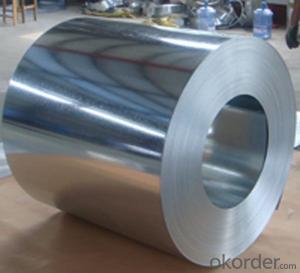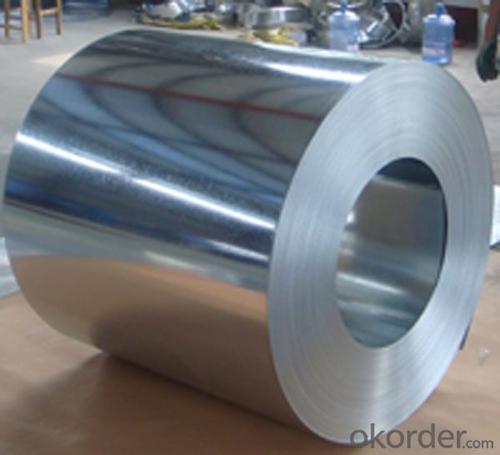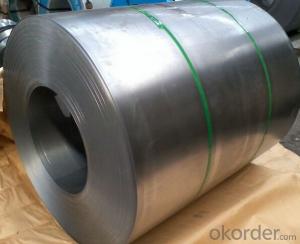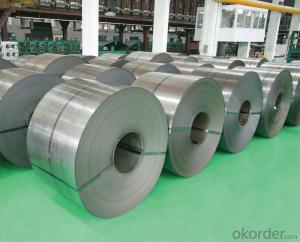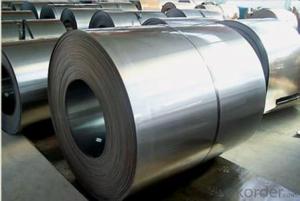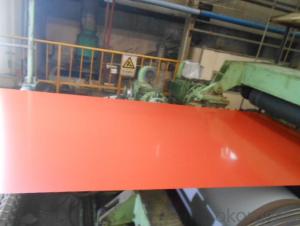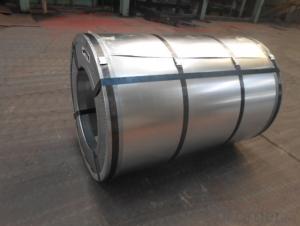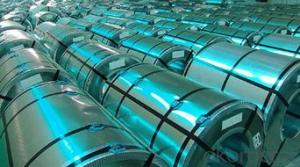Cold Rolled Steel Coil from the Best Quality
- Loading Port:
- China main port
- Payment Terms:
- TT OR LC
- Min Order Qty:
- 25 m.t.
- Supply Capability:
- 1000000 m.t./month
OKorder Service Pledge
OKorder Financial Service
You Might Also Like
Specification
1.Structure of Cold Rolled Steel Description:
The raw material of cold rolled steel coil/sheet is high quality hot rolled product, and after pickling continuous rolling, degreasing, annealing,skin pass,slitting and cut to length line etc. Along with it many kinds of new technology and new process of global cold rolling production have been applied. Therefore the quality of the goods could be guaranteed. The product is widely used in outdoor and interior decoration, furnishing manufacturing, home appliance, automobile etc.
2.Main Features of the Cold Rolled Steel:
• High strength
• Excellent process capability
• Good formability
• Good visual effect
• Smooth and flat surface
• Workability, durability
3.Cold Rolled Steel Images
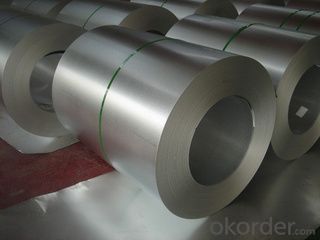
4.Cold Rolled Steel Specification
Standard:AISI,ASTM,DIN,GB,JIS,JIS G3302 ASTM 653M EN10142
Grade: Q195~Q345
Coil ID:508/610mm
Chemical composition:
5.FAQ of Cold Rolled Steel
We have organized several common questions for our clients,may help you sincerely:
1. How long can we receive the product after purchase?
Usually within thirty working days after receiving buyer’s advance payment or LC. We will arrange the factory manufacturing as soon as possible. The cargo readiness usually takes 15-25 days, but the shipment will depend on the vessel situation.
2.How to guarantee the quality of the products?
We have established the international advanced quality management system,every link from raw material to final product we have strict quality test;We resolutely put an end to unqualified products flowing into the market. At the same time, we will provide necessary follow-up service assurance.
- Q: How are steel coils used in the manufacturing of storage tanks?
- Steel coils are used in the manufacturing of storage tanks as they are rolled into cylindrical shapes and welded together to form the tank's body. The coils provide strength and durability to the structure, ensuring the tank can withstand the pressure and weight of stored materials.
- Q: How are steel coils used in the production of kitchen appliances?
- Steel coils are used in the production of kitchen appliances as they are transformed into various components such as panels, doors, and frames. These coils are typically cut, shaped, and welded into desired forms, providing strength, durability, and a sleek finish to the appliances.
- Q: What are the different types of corrosion protection methods used for steel coils?
- There are several types of corrosion protection methods used for steel coils. These include applying a protective coating such as paint or zinc, using corrosion inhibitors, employing cathodic protection techniques, and utilizing barrier protection methods like galvanizing or metallizing. Each method has its own advantages and is chosen based on the specific needs and requirements of the steel coils.
- Q: What are the different types of welding used for steel coils?
- Steel coil fabrication involves the utilization of various welding techniques, each catered to specific requirements and applications. Here, we present some commonly employed welding methods for steel coil fabrication: 1. Stick welding, also known as Shielded Metal Arc Welding (SMAW), utilizes a flux-coated electrode and an electric current to generate an arc between the electrode and the base material. SMAW is a versatile and extensively used technique suitable for a range of steel coil applications. 2. Gas Metal Arc Welding (GMAW), also referred to as MIG (Metal Inert Gas) welding, employs a continuous wire electrode and a shielding gas to safeguard the weld pool against atmospheric contamination. GMAW is renowned for its high welding speed and ease of automation, making it a favored choice for steel coil manufacturing. 3. Flux-Cored Arc Welding (FCAW) shares similarities with GMAW, but employs a tubular electrode with flux inside. The flux serves as both the shielding gas and added alloying elements, resulting in enhanced efficiency and weld quality. FCAW is often employed for high-speed welding applications in steel coil fabrication. 4. Gas Tungsten Arc Welding (GTAW), also known as TIG (Tungsten Inert Gas) welding, employs a non-consumable tungsten electrode and an inert gas, typically argon, to protect the weld area. GTAW delivers high-quality, precise welds with exceptional control over heat input, rendering it suitable for thin steel coil materials and critical welding scenarios. 5. Submerged Arc Welding (SAW) involves the use of a continuously fed wire electrode and a granular flux that covers the weld area. The arc is submerged beneath the flux, providing excellent protection and minimizing the need for post-weld cleaning. SAW is commonly employed for welding thick steel coils due to its high deposition rates and deep penetration capabilities. These examples highlight the diverse range of welding techniques employed in steel coil fabrication. The selection of the appropriate welding method depends on factors such as the specific steel grade, thickness, desired weld quality, production speed, and cost considerations. It is crucial to choose the suitable welding technique to ensure the longevity and performance of steel coils across different applications.
- Q: What are the dimensions of steel coils used in the power generation industry?
- The dimensions of steel coils used in the power generation industry can vary depending on the specific application and requirements. However, in general, steel coils for power generation are typically available in various sizes and thicknesses. The width of steel coils used in power generation can range from a few inches to several feet, depending on the specific equipment or machinery they are intended for. These coils are often designed to fit specific manufacturing processes or components within power generation systems. The thickness of steel coils used in the power generation industry can also vary significantly. Thicker coils are commonly utilized for heavy-duty applications that require increased strength and durability, while thinner coils may be suitable for less demanding tasks or where weight reduction is a priority. Additionally, the weight of steel coils used in power generation can vary depending on their dimensions and the specific steel material being used. The weight is an essential consideration during transportation, installation, and handling of the coils. It is important to note that the dimensions of steel coils used in the power generation industry can be customized to meet specific project requirements. Manufacturers typically work closely with power generation companies to understand their needs and provide tailored solutions that meet their dimensional specifications.
- Q: What are the challenges in coil slitting?
- Coil slitting is a process used to cut large coils of metal into narrower strips of desired widths. While it offers several advantages in terms of efficiency and flexibility, there are also several challenges associated with coil slitting. One of the main challenges in coil slitting is ensuring consistent strip width accuracy. Since coil slitting involves cutting the metal coil into smaller strips, it is crucial to maintain consistent width measurements throughout the process. Any deviation in the strip width can lead to issues downstream in the production line, affecting the quality and functionality of the final product. This challenge requires the use of precise slitting equipment and careful monitoring of the process parameters. Another challenge in coil slitting is managing edge quality. The edge quality of the slit strips is critical, especially in applications where the edges need to be free from burrs or other imperfections. Achieving clean and smooth edges requires proper blade selection, positioning, and maintenance. Any defects or irregularities on the strip edges can impact subsequent processes like bending, welding, or coating. Additionally, coil slitting poses challenges related to the material itself. Certain types of metals, such as high-strength steels or alloys, can be more difficult to slit due to their hardness or brittleness. Slitting these materials may result in blade wear and premature failure, leading to increased downtime and maintenance costs. Furthermore, the presence of contaminants or surface defects on the coil can also affect the slitting process, requiring additional cleaning or preparation steps. Another significant challenge in coil slitting is handling and processing large coils. Coils can be heavy and unwieldy, making it crucial to have proper equipment and procedures in place to handle them safely. Additionally, the slitting process can generate significant amounts of scrap material, which needs to be efficiently managed and disposed of. Proper storage, transportation, and recycling of the scrap are essential to minimize waste and maintain a clean and organized working environment. In conclusion, coil slitting offers numerous benefits in terms of customization and productivity. However, it also presents challenges in maintaining strip width accuracy, managing edge quality, dealing with difficult materials, and handling large coils and scrap. Overcoming these challenges requires expertise, precision equipment, and careful process control to ensure the desired quality and efficiency in coil slitting operations.
- Q: I want to buy a VERY sturdy bunkbed, but don't know which one would be better with not getting loose or falling apart.
- Metal/Steel. :)
- Q: How are steel coils used in the manufacturing of shipbuilding?
- Steel coils are used in shipbuilding as they are a primary source of high-quality steel that is necessary for constructing the various components of a ship, such as the hull, decks, and superstructure. These coils are processed and shaped into plates, beams, and other structural elements, which are then assembled to form the framework of a ship. The strength and durability of steel coils make them ideal for withstanding the harsh conditions at sea and ensuring the structural integrity of the vessel.
- Q: Why can't the coil weight be too low?
- Because the steel coil is stored in warehouse stacking level, if the coil weight is too low, resulting in a single coil capacity is reduced, so that the steel roll easily crushed and deformed;
- Q: How are steel coils used in the manufacturing of airbags?
- Steel coils are used in the manufacturing of airbags to provide stability and structure. These coils are typically placed inside the airbag module to ensure proper deployment and inflation during a collision. The steel coils help maintain the desired shape and prevent the airbag from collapsing, allowing it to effectively protect the occupants of a vehicle in the event of a crash.
Send your message to us
Cold Rolled Steel Coil from the Best Quality
- Loading Port:
- China main port
- Payment Terms:
- TT OR LC
- Min Order Qty:
- 25 m.t.
- Supply Capability:
- 1000000 m.t./month
OKorder Service Pledge
OKorder Financial Service
Similar products
Hot products
Hot Searches
Related keywords
